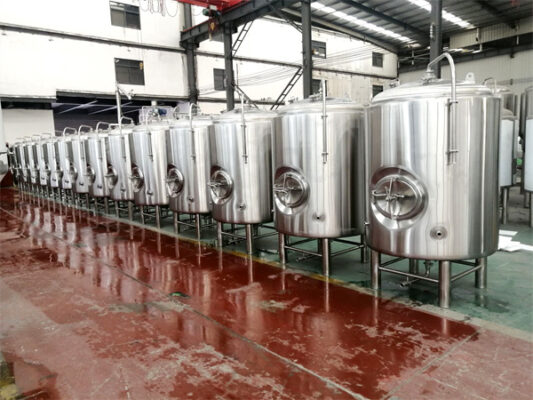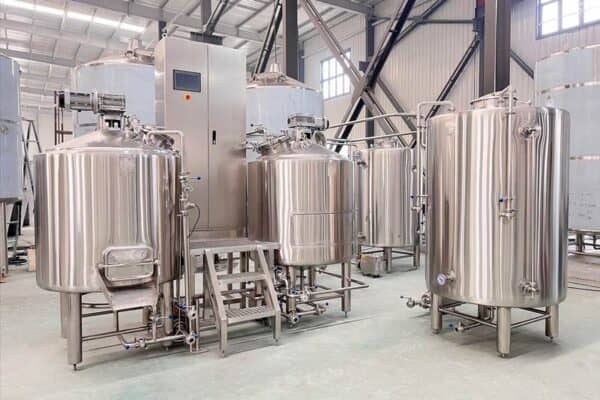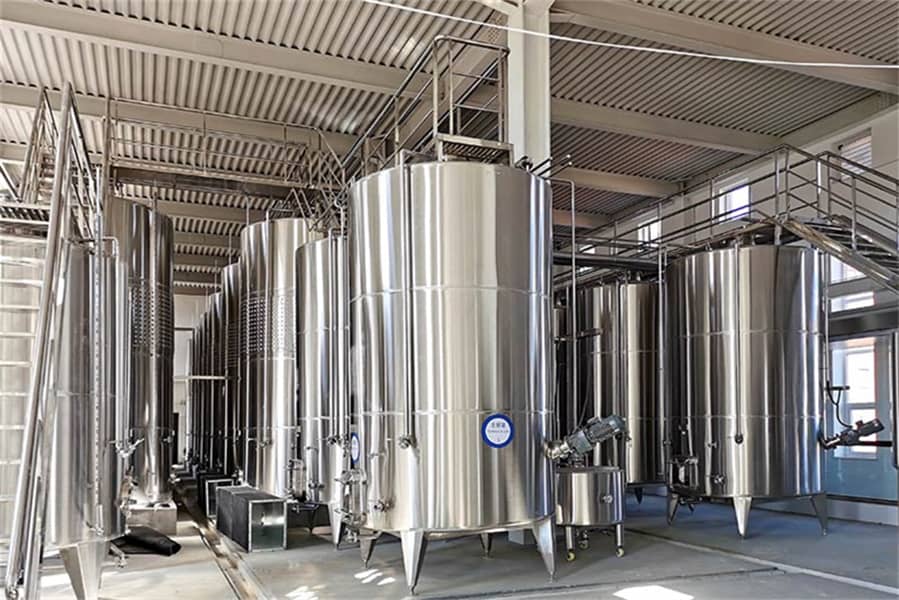Industrial beer making equipment refers to the large-scale systems and machinery used to produce beer in commercial breweries. Choosing the right equipment is key to efficient beer production. This guide covers the key types of industrial beer making equipment, considerations for selection and buying, operation and maintenance, and suppliers.
Overview of Industrial Beer Making Process and Equipment
The typical stages of large-scale beer production include:
Brewing – Mashing, Lautering, Boiling, Whirlpooling
Fermentation – Yeast is added for fermentation and maturation
Filtration – Removal of yeast and stabilization
Packaging – Kegging, bottling, canning
The main equipment used includes:
| Equipment | Function |
|---|---|
| Mash Tun | Converts malted grains into a sugary liquid called wort through mashing and lautering processes. |
| Brew Kettle | Boils the wort, adding hops and other flavoring agents to create the beer’s flavor profile. |
| Fermentation Tank | Ferments the wort with yeast to convert sugars into alcohol and carbon dioxide, producing beer. |
| Bright Tank | Stores and clarifies the beer after fermentation, allowing any remaining particles to settle out. |
| Cooling System | Rapidly cools the hot wort before fermentation to prevent undesirable flavors and aromas. |
| Filtration System | Removes solids and haze from the beer, creating a clear and visually appealing final product. |
| Carbonation Equipment | Injects carbon dioxide into the beer to achieve the desired level of carbonation. |
| Packaging Equipment | Fills bottles, cans, kegs, or other containers with the finished beer and seals them for distribution. |
| Cleaning and Sanitizing | Equipment such as CIP (Clean-in-Place) systems to maintain cleanliness and hygiene in the brewing process. |
| Boiler | Generates steam used for various processes, including heating the mash and sterilizing equipment. |
| Grain Mill | Crushes malted grains to expose starches and enzymes for mashing, aiding in wort production. |
| Hopper | Holds and dispenses grains or other ingredients into the brewing process, such as hops for flavoring. |
| Heat Exchanger | Cools the wort rapidly by exchanging heat with cold water, improving fermentation efficiency. |

Industrial Beer Making Equipment Types
| Equipment | Description |
|---|---|
| Brewhouses | Performs mashing and lautering functions |
| Brew Kettles | Boil mashed malt/water mixture (wort) |
| Fermenters | Stainless steel vessels for fermenting/maturing |
| Bright Beer Tanks | Filtered beer storage before packaging |
| Filtration Systems | Remove yeast, particles, stabilize beer |
| Canning Lines | Automated filling and seaming of cans |
| Bottling Lines | Automated filling and capping of bottles |
| Kegging Lines | Automated cleaning, filling, seaming of kegs |
Capacity, Design and Customization
Industrial beer equipment ranges widely in production capacity and degree of automation. When selecting, key factors to consider include:
| Factor | Details |
|---|---|
| Production Volume | Daily/annual beer output goals? |
| Degree of Automation | Manual, semi-auto, or fully automated? |
| Available Space | Floorplan, ceilings, doorways – height, width constraints |
| Budget | Lower cost options may sacrifice automation |
| Expandability | Built-in capacity to add modules/lines? |
| Customization | Tailored to brewery goals and layout |
Many suppliers offer modular equipment that can be expanded and customized. Configuring systems specifically to brewery space, layout, and processing preferences ensures efficient design and expansion capability.
Suppliers and Price Ranges
There is a wide range of industrial beer equipment suppliers globally. Prices vary greatly depending on production volume, materials, and automation.
| Supplier | Price Range |
|---|---|
| JVNW | $100,000 – $5 million |
| Prospero | $250,000 – $2.5 million |
| XacBank | $500,000 – $15 million |
| BrewFab | $1 million – $10 million |
Typical Price Ranges By Equipment:
| Equipment | Typical Price Range (USD) |
|---|---|
| Mash Tun | $10,000 – $50,000 |
| Brew Kettle | $15,000 – $70,000 |
| Fermentation Tank | $5,000 – $30,000 |
| Bright Tank | $5,000 – $25,000 |
| Cooling System | $5,000 – $20,000 |
| Filtration System | $10,000 – $40,000 |
| Carbonation Equipment | $5,000 – $15,000 |
| Packaging Equipment | $10,000 – $100,000+ |
| Cleaning and Sanitizing | $2,000 – $10,000 |
| Boiler | $10,000 – $50,000 |
| Grain Mill | $2,000 – $10,000 |
| Hopper | $1,000 – $5,000 |
| Heat Exchanger | $5,000 – $20,000 |
Installation, Operation and Maintenance
Proper installation, operation and maintenance ensures maximizing production efficiency and equipment lifetime.
| Phase | Key Activities |
|---|---|
| Installation | Performed by supplier engineers
Calibration, trial batches |
| Operation | Following SOPs, hygiene monitoring
Efficiency monitoring |
| Maintenance | Daily cleaning protocols
Preventative maintenance schedule |
| Training | For brewers/operators
Troubleshooting issues |
Suppliers typically provide installation services and operator training. Preventative maintenance and daily sanitation SOPs are key for longevity and performance.
How to Select an Industrial Beer Equipment Supplier
Choosing a supplier for industrial-scale beer equipment requires careful evaluation:
| Considerations | Evaluation Criteria |
|---|---|
| Reputation & Experience | Years in business
Brewer references and reviews |
| Quality & Testing | Certifications
Documentation of Quality Control testing |
| Customization Offerings | Ability to tailor equipment to specifications |
| After Sales Support | Service response time
Availability of spare parts |
| Budget Suitability | Total project cost
Financing options available |
Get quotes from multiple vendors and ask detailed questions on customization options, delivery timelines, warranties, and post-purchase support capabilities. An established supplier known for quality and service is recommended for this major investment.

Pros and Cons of Industrial Beer Equipment
Pros
| Pros of Industrial Beer Equipment | Description |
|---|---|
| Consistency | Industrial equipment ensures consistent beer quality by controlling various parameters such as temperature, pressure, and fermentation time. |
| High Production Capacity | These systems are designed for high volume production, making them suitable for breweries with large-scale operations. |
| Efficiency | Industrial equipment is efficient, reducing production time and energy consumption compared to smaller setups. |
| Quality Control | Sophisticated monitoring and automation systems allow for precise quality control, resulting in reliable and uniform beer products. |
| Cost-Effective in the Long Run | While the initial investment is substantial, industrial equipment can be cost-effective over time due to increased production and reduced operational costs. |
| Scalability | Breweries can easily scale up production by adding more tanks or upgrading components without significant disruptions. |
| Automation | Automation reduces the need for manual labor and minimizes the risk of human error during the brewing process. |
| Consistent Packaging | Industrial equipment often includes automated packaging solutions, ensuring consistent bottle or can filling and labeling. |
| Product Innovation | Some industrial equipment offers flexibility in recipe experimentation and product development. |
| Competitive Advantage | Larger breweries using industrial equipment can compete effectively in the market and distribute their products more widely. |
Cons
| Cons of Industrial Beer Equipment | Description |
|---|---|
| High Initial Costs | Industrial beer equipment can be expensive to purchase and set up, making it a significant financial investment for breweries. |
| Large Space Requirements | Industrial equipment requires ample space, which may not be feasible for smaller breweries or those with limited facilities. |
| Maintenance Costs | Ongoing maintenance costs for industrial equipment can be substantial, including repairs and replacement parts. |
| Limited Flexibility | Industrial systems may lack the flexibility to experiment with different beer styles or recipes compared to smaller, craft equipment. |
| Higher Energy Consumption | Industrial equipment tends to consume more energy, leading to higher utility bills and environmental concerns. |
| Complex Operation | Operating industrial-scale equipment can be more complex, requiring specialized training and expertise. |
| Risk of Overproduction | Due to the large batch sizes, breweries using industrial equipment may face the risk of overproducing beer, leading to potential waste. |
| Less Personalized Touch | Industrial brewing can result in a less personalized approach to beer production compared to craft brewing. |
| Longer Setup and Cleaning Times | The setup and cleaning processes for industrial equipment can be time-consuming and labor-intensive. |
| Limited Community Engagement | Breweries using industrial equipment may find it challenging to connect with their local community compared to smaller, craft breweries. |
Carefully weighing benefits vs drawbacks including production goals is key in determining the ideal system.
FAQ
Q: What is the lead time for obtaining industrial beer brewing equipment?
A: Lead times range from 8 to 16 weeks typically, depending on customization and production workload. Confirm timelines with manufacturer during ordering.
Q: What are the electrical and utility requirements for industrial brewhouses?
A: Large equipment may require 380 to 480 volt, 3 phase electrical systems, steam systems, cooling water. Must be installed prior.
Q: What are examples of options for financing equipment purchases?
A: Financing options include commercial bank loans, USDA microloans, crowdfunding campaigns, grants or self-investment financing. Discuss best options for your brewery with suppliers.
Q: Should we work with architects on brewhouse layout and design?
A: Yes, engage commercial architects and engineers from the start. Ensure proper construction including floor drains, materials, utilities, door heights to accommodate equipment.
Q: Can suppliers handle dismantling and relocating used systems?
A: Many suppliers have dedicated crews to handle acquiring and reinstalling used breweries. This can greatly reduce startup costs. Discuss options with sales reps.





certainly like your website but you need to take a look at the spelling on quite a few of your posts Many of them are rife with spelling problems and I find it very troublesome to inform the reality nevertheless I will definitely come back again